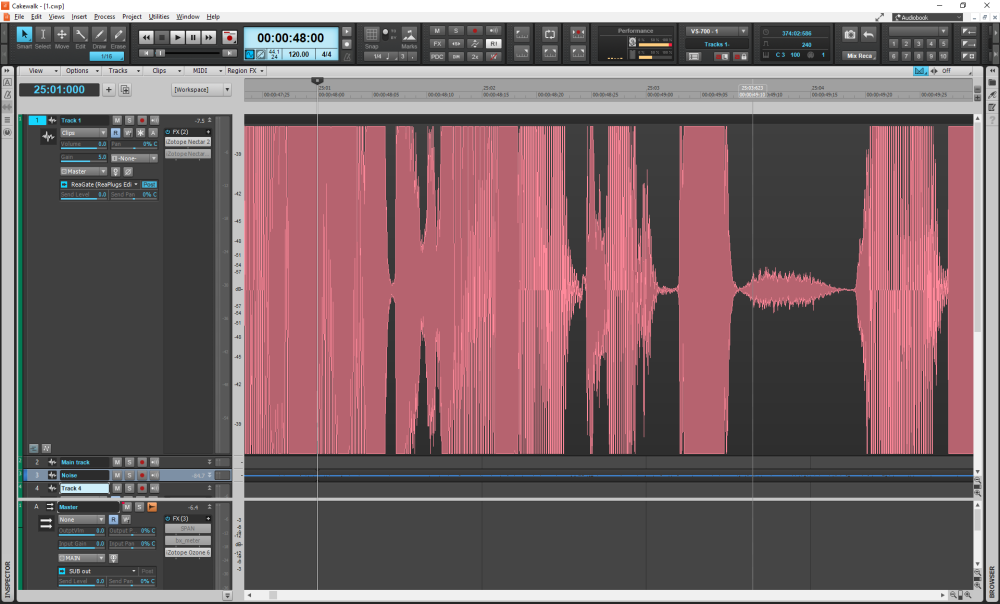-
Posts
169 -
Joined
-
Last visited
Everything posted by John T
-
I can... that'd be great if you could take a look. Where do I send it to?
-
Hmm. Still laggy with a new project.
-
Ah, that's an interesting point, yes. I'll try creating a project from scratch rather than just testing an existing one.
-
Ah, thanks, that's useful data. I do think (and hope!) that it's a config problem.
-
Display scaling is 100%, so presumably native.
-
No, and not really doing anything much display wise. The waveform is zoomed in vertically, and that's it really.
-
That's not the issue. With them on or off, the difference between CbB and the new Sonar is still there. I tried making a video, but it doesn't really look like anything; you kind of have to feel it.
-
With respect, I'm not asking how to do this. I've worked with thousands of hours of narrative content, and have been doing what I describe successfully in Cakewalk for nearly a decade. The track is not compressed; as I mentioned, it's very zoomed in.
-
So... among my audio jobs is audiobook and podcast editing. It's probably about a third of how I make a living. One of the things I do (in Cakewalk bB) is scan along a *very* zoomed in waveform looking for bumps and other messy sounds *before* even listening to the thing. This is many orders of magnitude faster than just doing it by ear, starting and stopping for every fix. Of course, you still have to do a full listen, but the amount of stuff you can knock off in better than real time with a method like this is enormous. Looks like this: In that view, I'm using CTRL+PgUp / PgDn to flick through a couple of seconds at a time. Anyway, since I'm not going to have the option to work in CbB from some time in August, I've been testing out what the impact of the switch to Sonar will be. For most use cases I have, and certainly for music mixing, I'm fine with it. However, for the specific case above, Sonar is significantly more laggy than CbB. CbB is more or less instantaneous, where there is a tangible lag in Sonar. This is genuinely going to impact my efficiency and work rate. Anyone got any ideas as to why this difference exists? Is it something I can fix with a setting somewhere?
-
Another vote from me against this now time thing, though not entirely. I can completely see the logic of moving it; it made no sense where it was. However, I think this is an example of under-solving a problem. It sensibly belongs alongside the main now time, but there's not actually room to make it readable without redesigning that box more throughly. "Just make it tiny" is not a solution. A swing and a miss, IMO. To generalise this point a bit, I dabble with each Sonar version as it comes out, but I haven't yet got a membership. The subscription model isn't my favourite, but it's the generally worse readability than CbB that's actually holding me back. The main interface is quite good, but things like this and the pro channel EQ UI are frustratingly inferior to the previous versions.
-
Having to warn people about ASIO4ALL in the year 2025 is like having to warn them to stay out of fairy circles and always keep garlic above the door or something. I'm surprised there are even still websites mouldy enough that you can download the thing.
-
This seems a likely candidate. I've just discovered that it's not happening on *all* projects. Will do some investigations.
-
This seems a likely candidate. I've just discovered that it's not happening on *all* projects. Will do some investigations.
-
Neither of those things. Export starts a few mins into the timeline in this case. And exporting as wav.
-
Using last version of CbB. Am just doing some experiments with masters for an album where one track flows seamlessly into the next. I have a solution for the time being, and will assemble it in HOFA instead of Cakewalk, but I have discovered something odd. Seemingly no matter what I do, I end up with 0.033 seconds of silence added to the start of the file. Am exporting by selecting only a clip in Cakewalk, and the audio data in that clip starts right away. Anyone ever come across this?
-
Yeah, pretty essential feature this for how I work.
-
It might be time to get over the discontinuation of Project five two decades ago.
-
I'd like to distance myself from any themes of "cakewalk are lying cowards" and "kids don't make real music any more" emerging in this thread. I don't believe either of those things.
-
The thing that puts me off the subscription is that I use a DAW to make a living, every day. And given how erratic what I make a living at is, cash flow problems do happen. So if my main work software is going to lock up and stop me working abruptly because of a missed payment, that's not good. May seem a fringe case, and it is, but these things do happen.
-
It's been in for years. My screen captures in this thread are from CbB.
-
I find save time is mostly dependent on the number of edits in audio tracks. Extremely dense MIDI data can also contribute. The actual length of the project time wise doesn't really matter. Say for example you had 8 tracks of unedited audio, of let's say a two hour concert. The project file for that is tiny, just eight track numbers / names and start times, more or less. And the save time will be really quick. Where on my audiobook work, I can often have a single track of audio with hundreds of tiny edits over a half hour chapter, and that will save significantly slower.
-
I agree with this. Also, one of my use cases is audiobook and podcast editing, and it's a tangible slow down having to check for phantom marks like this.
-
I'm not sure about that. There isn't a click there, so there shouldn't be a detail to highlight, really. Though next time it happens, I'll see what turning the outline on and off does.
-
Got a video clip here. Observe the spike appearing and disappearing as I zoom in and out. Though there's not much consistency as to what levels it appears and disappears at. 2024-09-01 21-01-48.mp4
-
I see this all the time, though I've not got any screen shots. I'll try to remember to come back to this thread next time it happens. I find that these glitches disappear and re-appear at different zoom levels, which might be a clue as to the cause.






